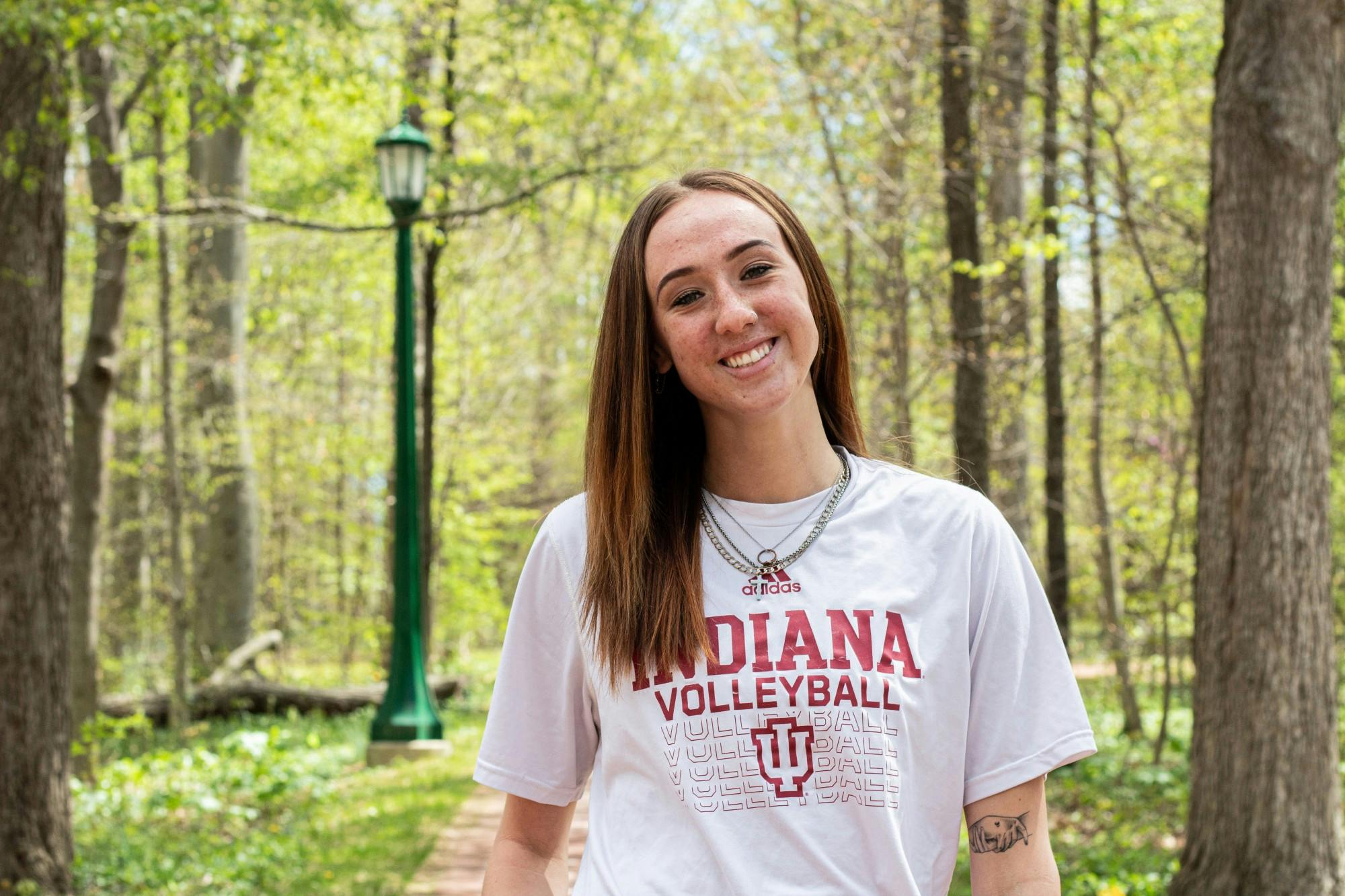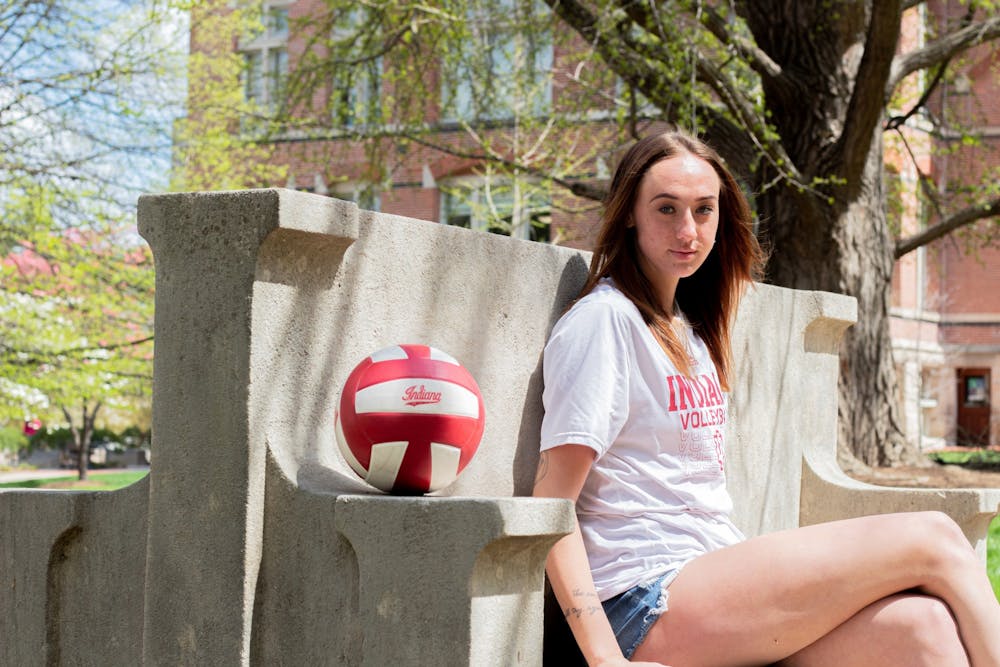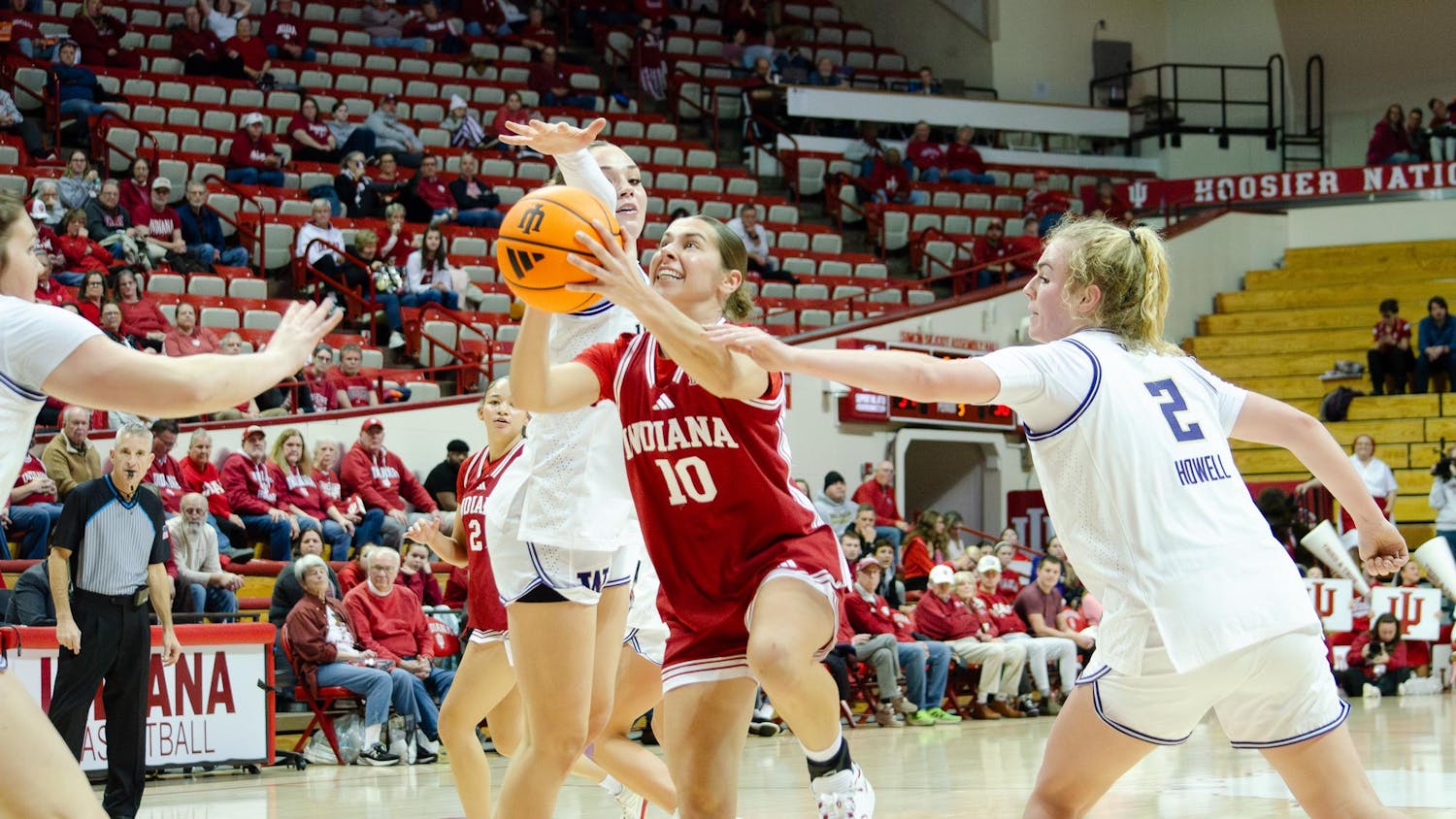Content warning: This article discusses topics that may be disturbing to some readers, including issues surrounding self-harm and suicide.
When you think about a college athlete, you don’t think about someone who can’t find the energy to get out of bed. You don’t think about them sitting alone on a bench at 3 a.m. in the snow. You don’t wonder if they’re going to take their own life if no one finds them.
Maybe you should.
IU junior Kari Zumach, a right side/outside hitter for IU volleyball, has dealt with all of these things while playing volleyball.
Zumach transferred to IU her sophomore year. She earned accolades for her play during her freshman year, including securing the Big East Freshman of the Week title twice and helping her team win the Big East Championship.
The transfer was seen as necessary by people close to her and was influenced by factors dating back to eighth grade.
“When I was 14, I had my first anxiety attack, but at the time I didn’t know that it was an anxiety attack,” Zumach said. “My parents were kind of like ‘oh, she’s freaking out,’ whatever. And you don’t know how to put it into words, so it’s not something where you can be like, ‘No, something is wrong.’”
As Zumach continued into high school, she started having more “anxiety fits,” as she called them, and began self-harming. Extreme mood swings started when she was 17. She developed bulimia her senior year.
But nothing seemed out of the ordinary to anyone else. Zumach said her parents just thought she had typical teenage girl problems. After all, she was still sticking to her schedule and succeeding in volleyball.
Zumach never received education on mental health in high school. She didn’t know how to identify her problems or how to ask for help, and when her parents voiced concerns, she denied everything.
Zumach went out-of-state for her freshman year of college, where her mental health continued to deteriorate. She tried to cope in her usual ways, but the new environment prevented her from keeping her mental health a secret.
Because of the close community at school, everyone quickly noticed something was wrong and addressed it right away.
“I am under a microscope at this point,” Zumach said. “Being told to conform in a certain way and act a certain way and represent a brand, essentially, in a certain way.”
Zumach’s coaching staff encouraged her to seek out help from a doctor.
She denied their suggestions.
That was the first time anyone had pushed her to get help.
It took passing out after a class for Zumach to start therapy, in which she was diagnosed with depression and generalized anxiety disorder and placed on antidepressant medication.
“I was massively, massively depressed my freshman year of college,” Zumach said. “But it was hidden well because I was successful in my sport.”
In November 2018, Zumach tried to take her own life.
“No one really knew how to deal with it,” she said. “This doesn’t happen very often, especially in college athletics because everybody’s ‘OK.’ Everybody has to be OK because you have to play your sport.”
The year continued without much change. Zumach stayed at school and continued to play volleyball, but she struggled internally with no sign of improvement, she said.
“There had been times where I would leave my dorm in the middle of a snowstorm, or something,” Zumach said. “I’d be like ‘OK, if nobody comes and asks me if I’m OK, then I’m going to attempt to take my own life again.’”
In the spring, Zumach got a “wake-up call,” she said, when she and her coaches mutually decided it would be best for Zumach to transfer somewhere else.

She received a call from IU head coach Steve Aird, prompting a visit to IU. On the trip, she spoke honestly with Aird about her anxiety disorder — something she had rarely ever done.
“I literally just blurted it out,” she said. “And so that was the first time that I had kind of brought that up to Steve. And I was kind of shocked because he was like ‘OK, that’s fine.’”
“I respect players who are honest with me,” Aird said about the conversation. “I just said, ‘If you’re going to come, I want to know all the good and bad. Just let me know who you are.’ She was very open with it.”
When Zumach arrived at IU in 2019, she said she felt like a new person. She started a new medication and began seeing a psychiatrist, who diagnosed her with bipolar disorder.
She also started learning about mental health for the first time to understand how to take care of herself and how to help others. She’s slowly become more comfortable vocalizing her needs to her teammates and staff, even though it can still be challenging.
“What had happened in my past was just such a horrible thing. I felt like I had been given up on, almost,” Zumach said. “Steve is always really good about being there for me and letting me know that it’s OK.”
“What’s cool about Kari is that you don’t know the impact her story and her willingness to share will have because the platforms are so immense,” Aird said. “The fact that she’s been able to take something that was such a tough thing to go through and turn it into a positive is exactly the story you want to hear.”
Social media, a platform with essentially no barriers, is an important part of spreading Zumach’s story to athletes and the rest of the world.
“It fosters that conversation, and that may be one of the most powerful things,” Lauren Smith, assistant professor of sports media at IU, said. “With the right hashtags and the right following, you can reach athletes in each sport across the country. It helps that ‘I’m not alone’ feeling.”

Zumach actively works to break the stigma around student-athletes and mental health on campus by being open about her own experiences and telling athletes they can always speak up if they’re struggling.
“The freshmen look up to her in the way of if they’re struggling with something, she’s the first person they go to because they know that she understands,” Breana Edwards, one of her best friends on the team, said. “If they don’t feel comfortable saying something, she’s like, ‘I got you,’ ‘I’ll stand up for you.’”
Zumach said she hopes more athletes can grow comfortable talking about their struggles and know they are not alone.
“My message is to please ask for help,” she said. “It’s so OK to be verbal about what you’re going through, and it’s so important to recognize that if you’re an athlete, sometimes you have to put your sport aside. Your mental health should always come first.”




